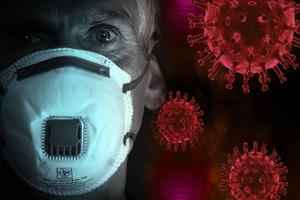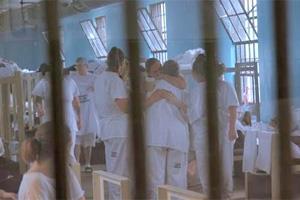
To know a thing might not be to own a thing exactly, but knowledge goes a long way toward understanding.
No one wants to watch a program about COVID-19, not now, but Tuesday's sober, authoritative PBS Frontline program The Virus: What Went Wrong will be welcome viewing for anyone looking for perspective — and reason over emotion.
The expanded, hour-and-a-half program is the work of longtime Frontline correspondent and producer Martin Smith, fresh off an assignment in Iraq and Iran. You know, the easy countries.
The Virus: What Went Wrong opens with New Year's Eve midnight celebrations at New York's Times Square, when hope and optimism filled the air — and I, myself, distinctly recall one partygoer shouting that she was happy to see the back end of 2019: 2020 could only be better.
Mere weeks later, correspondent Smith returned from the Middle East to the early signs of a new coronavirus. Already this one showed the signs of being more than just seasonal flu. "As a caution," Smith notes at the opening of the program, "I decided to quarantine in the Catskill Mountains, two hours north of New York City. I would do my reporting from here.
 "I wanted to understand where we were headed. Were we prepared; were warnings being heeded?"
"I wanted to understand where we were headed. Were we prepared; were warnings being heeded?"
One of his first videoconferencing calls — an early introduction to Zoom, if you will — was to Dr. David Ho, a renowned HIV researcher, virologist, and director and CEO of the Aaron Diamond AIDS Research Center, who Smith had worked with on a previous assignment when he was reporting on the AIDS epidemic.
"You don't look too worse for wear," Smith tells him, breaking the ice.
"I'm just putting up a good front here," Dr. Ho replies, deadpan.
And so, it begins.
Dr. Ho was on the front line — pun unintended — of the SARS outbreak in 2003, and now he was worried about COVID-19.
Smith asks Dr. Ho if he believes people grasp how serious the situation is, a question that would probably better be asked of certain national leaders. But then they weren't taking questions.
"I think people hear the news," Dr. Ho replies quietly. "They watch the coverage. But…it's hard to fully comprehend."
Fast-forward three months and, given what many scientists worry is an overly rapid lifting of lockdown restrictions, and it's clear many people still haven't fully comprehended.
"We did not realize the government would be so fully unprepared," he continues, favoring understatement over hyperbole.
So, Smith wants to know: What really happened? And why?
Those are the unanswerables people-in-the-know are still grappling with. It's hard to step back, gain proper perspective, and figure out ways we might be better prepared next time when we're still mired in the middle of a pandemic.
"There was a false assumption that it was somebody else's problem, that it would not happen to us," Dr. Ho reasons. "But that's the same kind of attitude that people had about many other epidemics in the past. We knew that if this thing blew up, that it would just continue to spread."
The first case was identified on Nov. 17, 2019, in Wuhan, China. There have been recent news reports — not mentioned in the Frontline program, based on an early preview screening — that Chinese authorities may have been aware of the new coronavirus as early as August.
 The World Health Organization doesn't come away clean, in Smith's estimation. The WHO was well-intended, but they didn't ask the tough questions of Chinese authorities at the time. No one, certainly no one in China, wanted to spoil the Lunar New Year festivities.
The World Health Organization doesn't come away clean, in Smith's estimation. The WHO was well-intended, but they didn't ask the tough questions of Chinese authorities at the time. No one, certainly no one in China, wanted to spoil the Lunar New Year festivities.
The Frontline program itself changes tone at this point and becomes a political thriller more than a cautionary medical tale about a looming pandemic. A steady stream of government officials and state leaders delay, deny, and obfuscate, and scientists, for the most part, are belittled and ignored. The question asked of national leaders becomes: What did they not know, and when did they claim not to know it?
The counsel of Dr. Ho and other scientists is that viruses work exponentially — doubling, tripling, and quadrupling in a matter of days — and, of course, that counsel was assiduously ignored. From here, The Virus: What Went Wrong accelerates, like an express train.
"Even if all you have is four cases, that is a dangerous moment," one researcher in-the-know tells Smith.
Try telling that to decision-makers who don't believe in science or math.
Frontline goes inside Singapore, Taiwan, Japan, Vietnam, and South Korea, the countries that took the opposite tack and tackled COVID-19 full-on, with strict lockdowns and widespread "deep cleans."
There are statistics, and then there are numbers that truly take the breath away: South Korea managed to test as many people in a week, Frontline reports, as would ordinarily take a year. Though not mentioned in so many words in the program, that's because South Korea is a country that has always poured resources into state education — and belief in science.
The US, like Russia, is geographically vast, with many disparate, far-flung, widely differing regions. State governors are possibly better positioned to deal with a pandemic outbreak within their own boundaries than a federal government with legislative oversight over every region from California to the Catskills.
That said, the federal government was slow to enact widespread testing; the one area the federal government is best positioned to act on.
Frontline then takes a look at Iran — a society anchored in religion and national pride — that does the exact opposite of what South Korea, Singapore, and the Southeast Asian countries did, with predictable and catastrophic results.
Archival video of then-President Barack Obama explaining the value of financing virus research is a reminder that it didn't need to be this way: South Korea's reaction was lightning fast, where the US's reaction under the present US administration was sluggish and slow.
 The US was not alone, mind you. Italy was also slow to react (left), and we can see what happened there. To date, 33,000 Italians have died from coronavirus. The number in the US is higher: 110,000 by most recent estimates. Positive messaging can only go so far: Science doesn't care about messaging, and viruses don't respect borders.
The US was not alone, mind you. Italy was also slow to react (left), and we can see what happened there. To date, 33,000 Italians have died from coronavirus. The number in the US is higher: 110,000 by most recent estimates. Positive messaging can only go so far: Science doesn't care about messaging, and viruses don't respect borders.
The Virus: What Went Wrong is not an easy watch. That was never its intention. Frontline has always been rooted in the idea that it's better to tell viewers what they need to know, not what they want to hear. Tuesday's Frontline is no entertainment diversion.
If you're curious, though, if you want to know what happened exactly, when, where, and in what order, this is TV worth watching.
PBS Frontline: The Virus, What Went Wrong airs Tuesday at 9:30 p.m. ET on PBS and YouTube, and streams on pbs.org at 7 p.m. ET (check local listings).